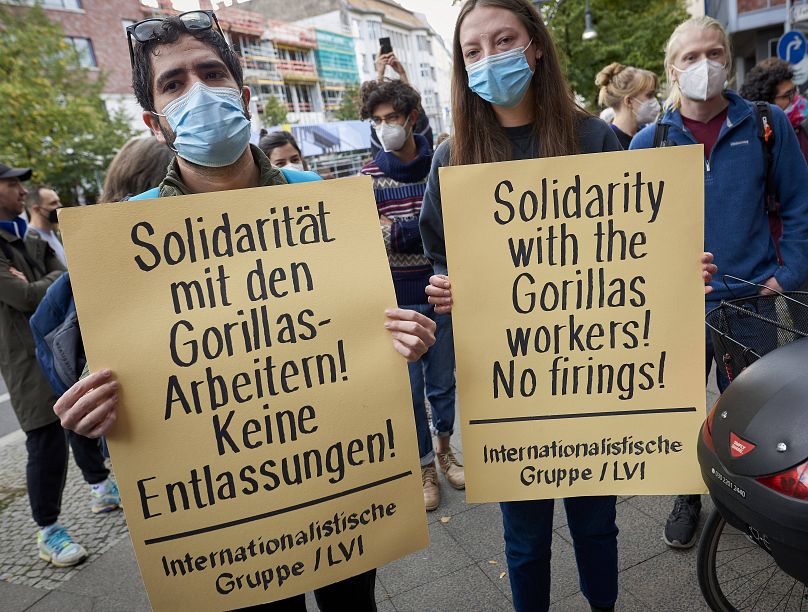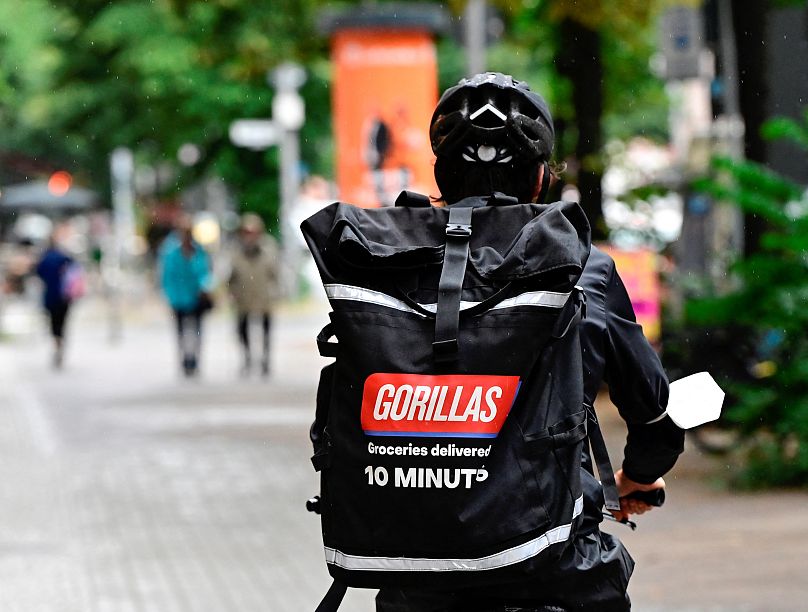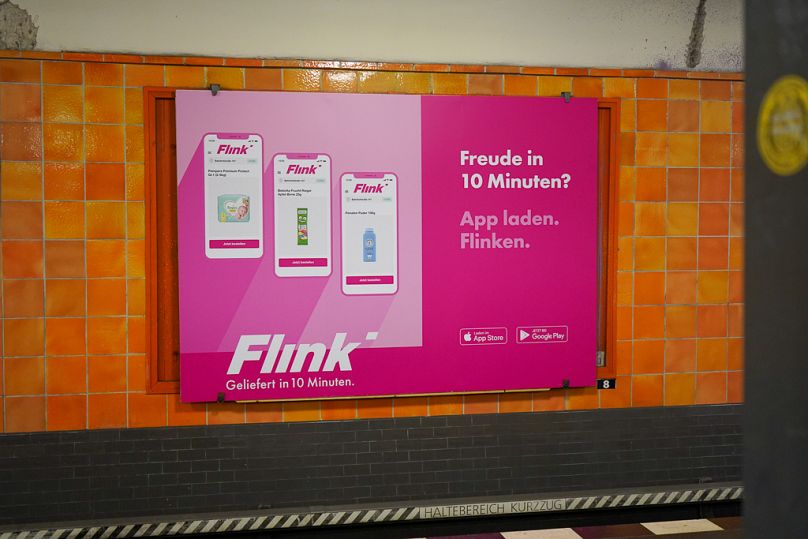Berlin's food delivery app rejected the idea of hiring gig workers. Did it work?
As temperatures drop and Berlin’s blue summer skies yield to the city’s signature winter slate, bike traffic thins out. Though the cold wards off many bike commuters, a steady flow of colour-coded couriers ensures cycling lanes don’t go totally unused.
The well-established deep orange and electric turquoise stylings of takeaway platforms Lieferando and Wolt have recently been joined by grocery delivery apps Gorillas, in black, and Flink, in shocking pink.
Though Gorillas might sport the most unassuming uniforms, it’s caught the eye of cash-flushed investors and frustrated critics alike.
One of the fastest-growing startups in Europe and mired in labour disputes, Gorillas is a potential harbinger of broader shifts in the bike delivery sector and the gig economy.
The $3 billion gorilla in the room
Founded in May 2020 and built on a promise to deliver groceries within 10 minutes, Gorillas achieved the vaunted start-up "unicorn" status by reaching a $1 billion (€858 million) valuation after just nine months, the fastest-ever German company to do so.
Launched in Berlin, Gorillas now operates in nearly 60 cities in 9 countries in Europe and North America. According to Ben Wray of the Gig Economy Project, this reflects a wider delivery app gold rush.
“It’s had this huge expansion, and Gorillas is riding right at the top of the wave of this big surge of venture capital that’s going into the sector in Europe right now,” Wray told Euronews.
Gorillas is currently valued at $3 billion (€2.5 billion), while competitor Flink, founded in Berlin in December 2020, is valued at $2.1 billion (€1.8 billion).
Since launching, part of Gorillas’ marketing efforts has been its focus on establishing better working conditions than rival delivery platforms.
Gorillas referred to itself as “an employee-centric company” in an e-mail conversation with Euronews. Despite this, the company has been wracked by increasingly radical waves of strikes in Berlin, and their recent response calls into question their self-crafted image.
Clashes between workers and management
In response to a wave of wildcat strikes over working conditions earlier this month, Gorillas fired hundreds of workers.
Euronews has confirmed that the firings were retribution for striking.
Up to 350 workers have been reported to be fired, though Yasha, a rider and member of the Gorillas Workers Collective, told Euronews it has yet to confirm the total number of workers dismissed.
Gorillas workers have been sporadically striking throughout this year in response to an array of grievances that include late and inconsistent payments, issues with workers receiving benefits, malfunctioning bikes and safety equipment, failure to adequately deal with accusations of harassment, and what workers claim are the unjust firing of their colleagues.
Seemingly minor shifts in Gorillas operations, like encouraging larger orders or expanding delivery distances, also have a significant impact on the day-to-day experience for riders.
Meanwhile, the collective claims a move to optimise operations has led to short staffing, a strain shifted onto workers.
“It’s about forcing workers to do double the amount of work they normally do. Of course, no one’s going to be happy about that. The promise is you get more tips, but that’s not guaranteed. It’s not a restaurant, tips are not a given,” said Yasha.
All this, exacerbated by the company’s difficulties in managing such rapid growth, puts strain on riders and renders safely delivering loads within 10 minutes ever more difficult.
But for Yasha, the core of workers’ complaints boils down to something more fundamental. “The company is disrespecting us,” he said.
Firing workers en masse does not exactly fit the company’s public identity. This summer, during another wave of strikes, CEO Kağan Sümer claimed he’d “never fire someone for striking”. Gorillas’ response to the most recent strikes, as well as a recently-leaked Slack thread where Sümer talked about firing a worker who was trying to unionise in spring, starkly contradict Gorillas’ corporate manifesto.
Wildcat strikes are rare in Germany. Their legality is disputed, though the consensus among labour lawyers is that they are illegal because striking workers technically do not uphold their contractual agreement with their employers.
This framing frustrates members of the collective, who are attempting to use the recent firings to build precedent for legal wildcat strikes in Germany.
“They don’t hold up their contractual agreement, but they expect us to hold up ours. It’s always the employee that has to take responsibility and go to the labour court, it’s never the company,” said Yasha.
Gorillas and the European gig economy
Ben Wray notes the core challenges facing Gorillas employees are distinct from most gig workers. “In terms of the specific issues the Gorillas workers have faced, in some ways they aren’t so typical of most problems you’d see across the continent with food delivery workers. They’re more typical of problems of low-paid, precarious work in general. Lack of equipment, not being paid properly, not being respected by management, etc.” he told Euronews.
Gorillas stands apart because of one of their biggest pro-labour selling points: their workers are regularly contracted employees instead of the gig economy standard of independent contractors.
“When we became one of the first instant delivery companies to step away from the gig economy model, we set out to ensure that our riders were considered as true employees of the company,” said Gorillas.
Though this has not helped stave off clashes between workers and management, it does provide a level of stability and security that most gig workers don’t have.
According to Wray, the European gig economy is quite fractured, with labour participation depending significantly on both the regulatory regimes and digital infrastructure in individual countries, yet there are some unifying factors among workers.
“Gig workers are disproportionately ethnic minorities and immigrants,” said Wray. In addition to health and safety risks for those in courier positions, steady wages are the greatest challenge facing workers in the sector.
“If you’re operating on an on-demand basis you simply don’t know what your earnings are going to be from week to week. And with many more people coming into this sector, there’s downward pressure on income,” he continued.
This structural precarity is exacerbated by instability within the start-up sector. When Deliveroo left the German market in 2019, more than 1,000 riders were left without a job with less than a week’s notice.
Though the Gorillas employment model shields their workers from many of these challenges, it’s clear the company isn’t fully insulated from recent militancy in the delivery app sector, where workers have been pushing for better rights from Belgium to Greece.
Change on the horizon
Regulators are responding to the workers’ agitation. In May, Spain ruled that nearly 17,000 delivery riders would have to be recognised as staff, not contracted gig workers. And this ruling could soon be the norm, as the European Union will announce a directive on platform workers by the end of the year.
Wray expects the directive to push platforms into providing workers with regular contracts, much like Gorillas. “This looks like it will flatten regulation across Europe. The European Parliament has been very clear that it expects a presumption of employment in platform work from the directive,” he said.
Though Gorillas is ahead of the regulatory curve, it still faces challenges going forward. The biggest long-term question is whether the grocery delivery model was merely a pandemic-fueled fad or if it represents concrete shifts in consumptive behaviour.
According to the Gig Economy Project, the food delivery sector has doubled in size since the start of the pandemic. Huge investments in companies like Gorillas and Flink indicates investors have faith in the model, and Wray sees grocery delivery as likely here to stay.
“In a sense, it’s part of how capitalism is continuously inventing new needs. We didn’t ever need to have our takeaways delivered to us, we could have walked and picked them up. But now lots of people take it for granted that their takeaway will be delivered to them. Maybe it’s the same for groceries,” he said.
In the short term, Gorillas have furious workers and the fallout of mass firings to deal with. Gorillas told Euronews it is working on implementing a number of improvements for riders, including additional safety equipment, a review of its scheduling system, and hiring “an important number” of workers.
Just how effectively Gorillas can implement these shifts will determine if their black-clad riders spend their time zipping up and down Berlin’s streets or standing in picket lines. And the company’s struggles indicate that even if Europe’s gig economy does evolve to look more like the Gorillas model, it certainly won’t be free of conflict.
Every weekday, Uncovering Europe brings you a European story that goes beyond the headlines. Download the Euronews app to get a daily alert for this and other breaking news notifications. It's available on Apple and Android devices.



